#literary reference
Text

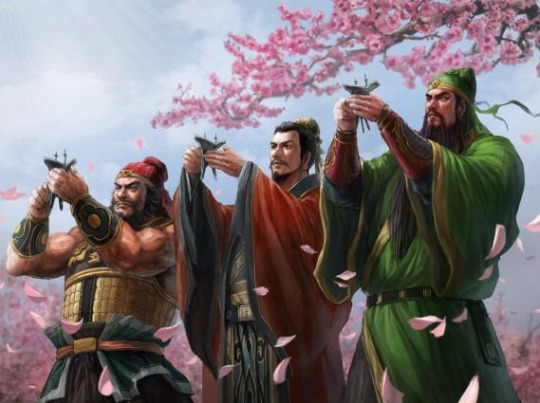
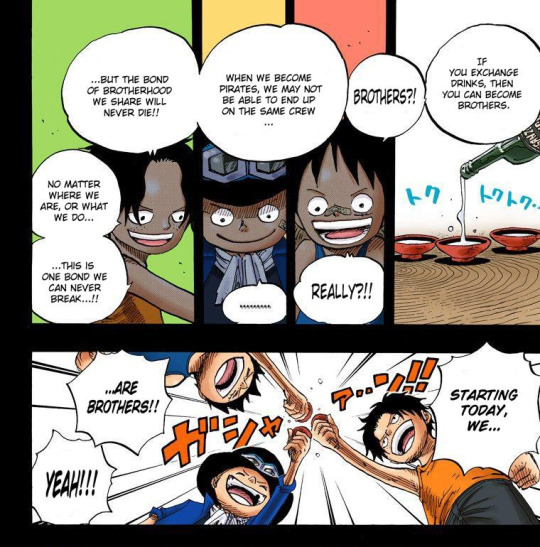
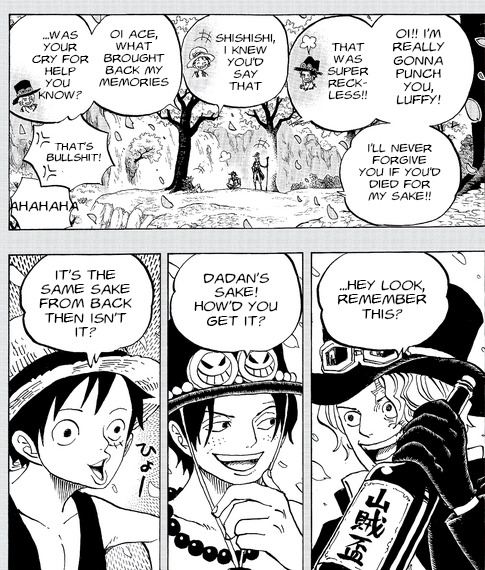
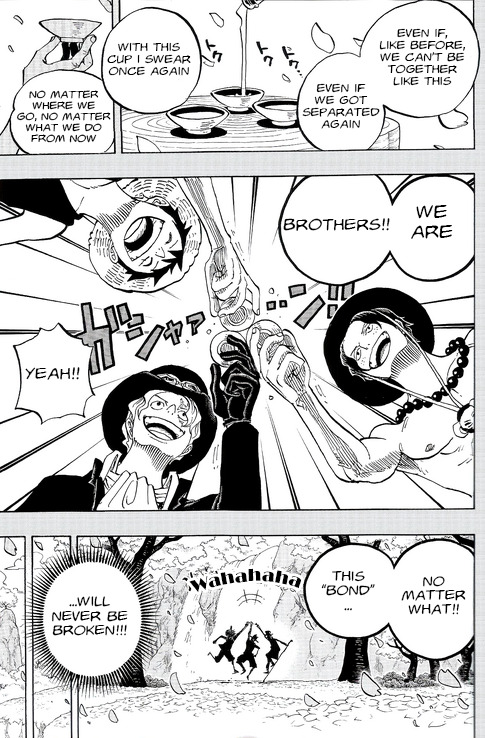
I never tried to look, so I don't know if anyone else ever mentioned this, but ASL's "Brotherhood cups" (兄弟盃) is reminiscent of the "Peach Garden Oath" from the Romance of the Three Kingdoms novel (the fiction, not the actual history).
The vibes of it is even stronger in the side story sensei made, where there's a scene of the ASL trio having the sake as grown ups under some kind of flowering trees. From what I can see those trees are sakura, but peach blossoms and sakura look very similar.
(you can read the side story here BTW)
In the Three Kingdoms, three men gathered in a garden of peach trees, offered some offerings, and then made this oath of brotherhood:
When saying the names Liu Bei, Guan Yu and Zhang Fei, although the surnames are different, yet we have come together as brothers. From this day forward, we shall join forces for a common purpose: to save the troubled and to aid the endangered. We shall avenge the nation above, and pacify the citizenry below. We seek not to be born on the same day, in the same month and in the same year. We merely hope to die on the same day, in the same month and in the same year. May the Gods of Heaven and Earth attest to what is in our hearts. If we should ever do anything to betray our friendship, may heaven and the people of the earth both strike us dead.
Kyoudai Sakazuki in general is something that the yakuza do, but the feeling of brotherhood oath that ASL swore is more similar to the Three Kingdoms one, especially because there's literally 3 of them.
In the actual text of the Three Kingdoms novel, there's no mention of wine being drunk while the oath was made, but it's a pretty common depiction in adaptations that they do drink some kind of wine (see the pictures above).
I think this is just a one time reference too, and not anything theory-worthy, but who knows.
#one piece#analysis#monkey d luffy#monkey d. luffy#sabo#portgas d ace#portgas d. ace#literary reference
65 notes
·
View notes
Text
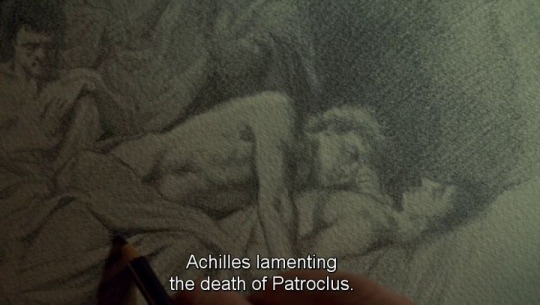
The lovers
He is half of my soul as the poets say-
#hannigram#murder husbands#nbc hannibal#shattering teacups#literary reference#religious allusion#mythology#Patroclus and Achilles#literature#the Iliad#classical literature
25 notes
·
View notes
Photo

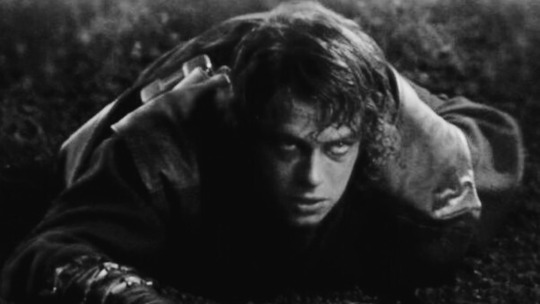
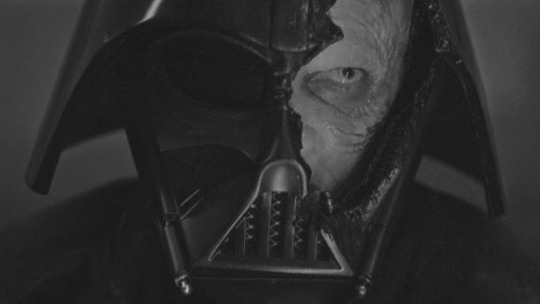


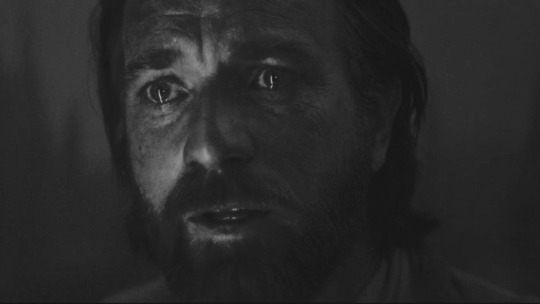


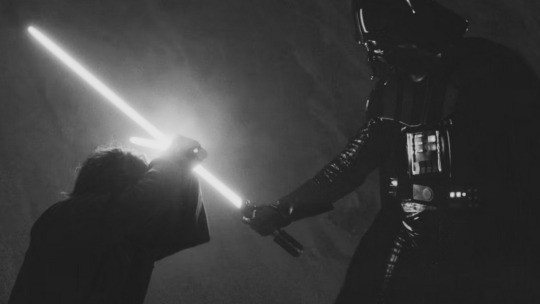
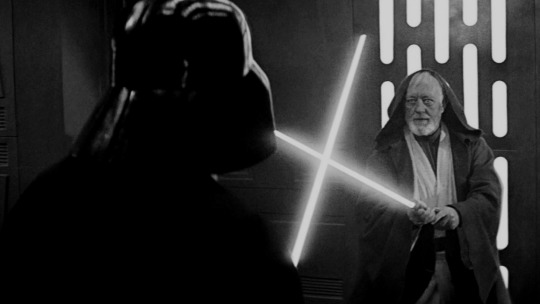
Love and Hatred
#literary reference#nothing but completely sane happy things on my blog#love and hate#anne rice#interview with the vampire#star wars#star wars prequels#obi wan kenobi#ewan mcgregor#hayden christensen#anakin skywalker#darth vader
173 notes
·
View notes
Text
He's a 10, but he put his sister living in the tomb.
#Books#Reading#Literary Reference#The Fall of the House of Usher#Edgar Allan Poe#Roderick Usher#Madeline Usher
2 notes
·
View notes
Text

I know we are going to be flooded with protest type merch, but I love this so much!!
@elderberriesandarsenic
9 notes
·
View notes
Text
There was a part in 1984 when Winston found a blank journal and started writing his thoughts down on paper. Thoughts he didn't want the Thought Police or his comrades at the Ministry of Truth to hear.
In a way, I feel like I'm like Winston because when I put my thoughts done onto paper, or on my feed... I can think clearly.
0 notes
Text
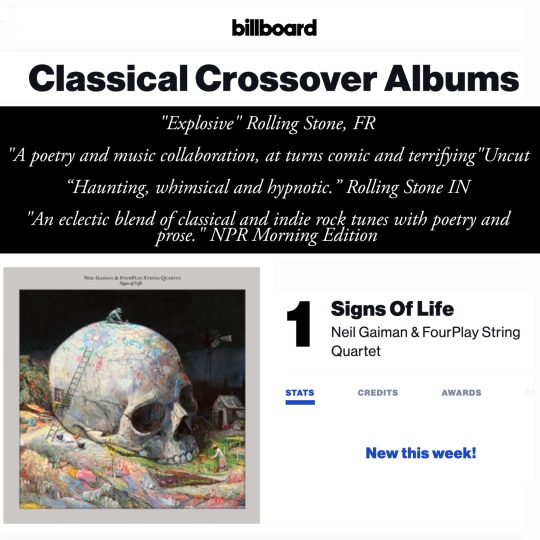
Now THIS was unexpected. But incredibly lovely. We debuted at #1.
I'm so proud of what we made and the genius that the Four Play String Quartet brought to the project.
If you want to find out how to listen or buy it on CD or Vinyl this will point you to the right places.
Meanwhile, I gloat. Hear me.
#i dont really gloat#it's a literary reference#to Stalky and Co#but i dont think many people have read that any more#although i don't think anyone had read it in 1968#2
1K notes
·
View notes
Text
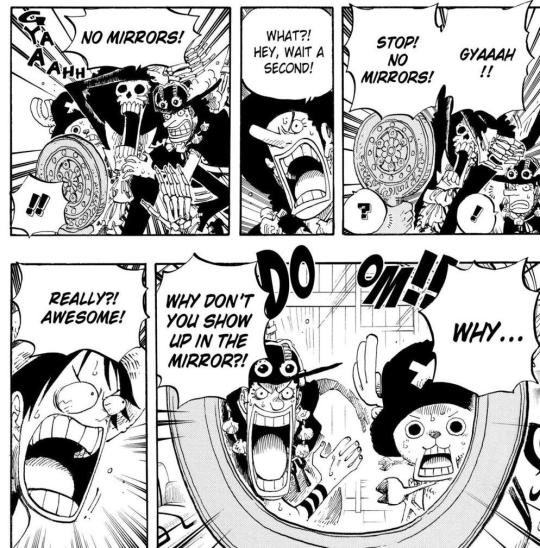
Oda plays a lot of horror tropes this arc, usually for comedy. The no reflection thing is more commonly associated with vampires, and while some stories will say that it's because old timey mirrors were backed with silver, others give the reason as vampires having no soul. Which is ironic, because all Brook has left is his soul

It's very similar with Brook having no shadow. Bram Stoker's vampires didn't cast shadows.
#opbackgrounds#one piece#ch443#encyclopedia Oda strikes again!#brook#literary references in *my* manga?#it's more likely than you think
376 notes
·
View notes
Text

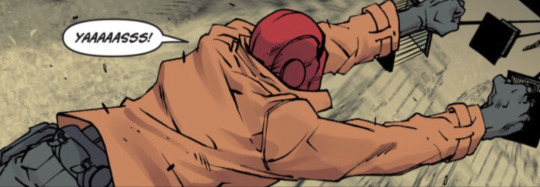
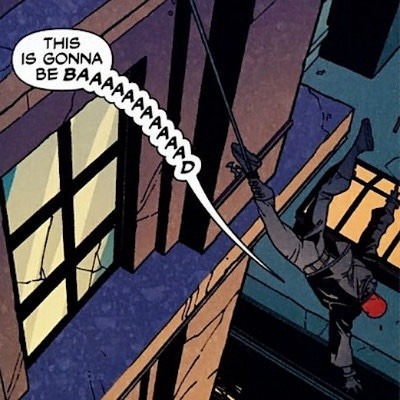

jason todd i might be in love with you a little bit
#his humor is great#it’s very situational and i love it#also the literary reference lmao#sarcastic king#jason todd#red hood#dc#dc comics
7K notes
·
View notes
Text
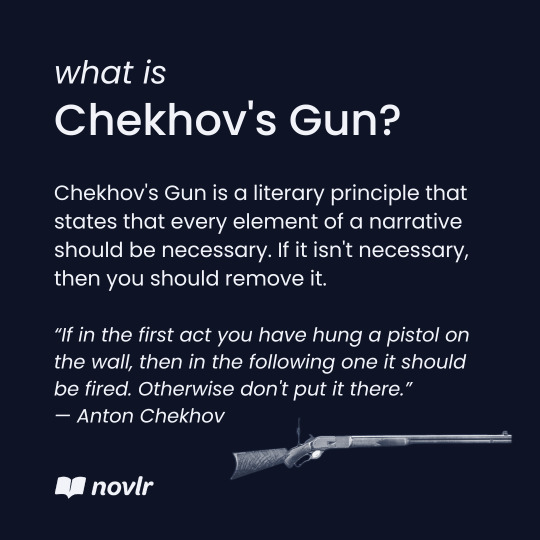
#writers#creative writing#writing#writing community#writers of tumblr#creative writers#writeblr#writerblr#writing tips#writblr#writing advice#references for writers#chekhov's gun#anton chekhov#literary principle#creative writing tips#writer things#advice for writers#writing references#writers corner
580 notes
·
View notes
Photo
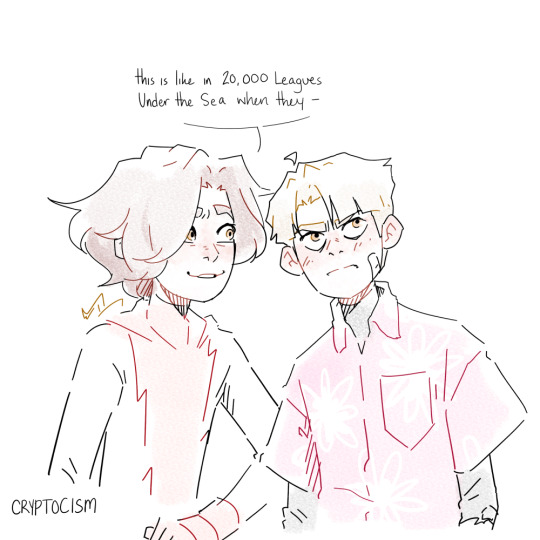
quick lil doodle of the boys
#my art#dc#bart allen#thad thawne#thaddeus thawne#impulse#inertia#do i enjoy the plotline where bart reads a library and suddenly becomes 'mature' and 'capable'#not exactly it is complicated#do i think bart making deep cut literary references would be funny as hell#yes i do#(is 20000 leagues a deep cut idk)
914 notes
·
View notes
Text
Germa and French references
(Plus bonus Star Wars mention at the end)
Sanji's iron mask in the flashbacks immediately made me think of Dumas's works, but when I saw it I didn't think much about it. It's just like, "Oh I guess it's just part of the Sanji = French thing". Plus in one of the cover arts Sanji was drawn in a classic Musketeer outfit, so I thought it was just for fun.
But Twitter user Marudoro-san made this thread that pointed out a bunch of the same references I'd caught and said "Hey, maybe this is actually important to the plot later", and I think they have a point. So I figured I'd share what I'd already noticed, and I will highlight the input that I got from Marudoro-san in red here in this post.
Iron Mask
The man in the iron mask is a French prisoner whose identity is never truly known in history. In his novel, Alexandre Dumas invented a plot where the iron masked prisoner is the twin brother of King Louis XIV, and the plot involves the famous Musketeers from the previous novels in a conspiracy of switching the king for the twin brother.
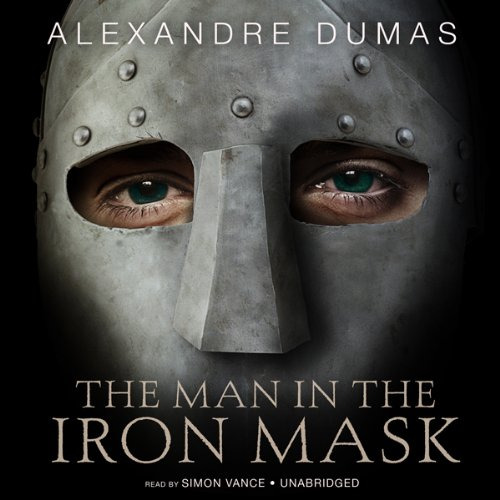
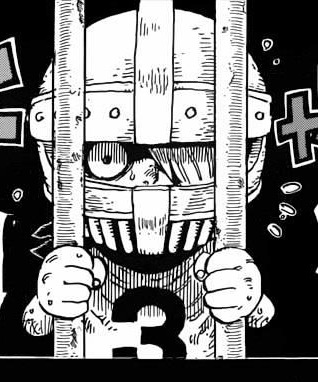
At a glance, it might be just a literary Easter egg, but when I look at it again, I do start to have questions. Within the One Piece scenario context, this is unnecessary. In the Dumas novel, the mask seems to be needed to hide the prisoner's identity. But there's no need to hide Sanji's identity, and it's not to prevent him from shouting for help because he can still talk even with the mask. What is it for? Is it a clue that the Man in the Iron Mask novel is relevant to this story?
For one, the fact that the iron masked prisoner being the king's twin is noteworthy. Sanji is one of 4 quadruplets, but still. Marudoro said that maybe this is a sign that Sanji and Ichiji will have a confrontation later. This makes sense, because of the other Vinsmokes, the one most likely to represent a "king" would be Ichiji.
This is something I myself had considered before, that Ichiji specifically might later have a role as "Sanji's opposite". I don't know how yet, but the imagery and themes that I've seen so far seems to point that way.
Marudoro also points out that if you look into the Musketeer novels, Sanji has vibes similar to Aramis, who is described as something of a womaniser. Aramis happens to be the mastermind behind the twin conspiracy in the Iron Mask novel.
The correlation is vague, and it's hard to tell how is this going to be relevant, besides maybe "there might be other French history/literature references in Germa's storyline".
Les Misérables, Revolution, the French Royalty
The only two Germa servants who actually has proper names, head chef Cosette and Sora's personal servant Eponi, seem to be references to the Les Misérables characters Cosette and Eponine. Part of the narrative of Les Mis is the June Rebellion, an uprising of the anti-monarchists.
In the Soul Pocus song that serves as the outro of the WCI arc, the "lyrics" specifically has the exact word "guillotine". For many people, guillotine is very closely linked to the image of the French Revolution and the execution of King Louis XVI and Marie Antoinette.

Speaking of guillotine... Yonji's attack, translated as "Winch Guillotine" in the official translation, is actually called "Winch Danton" in the raw. This is possibly a reference to Georges Danton, and important figure of French Revolution, who is curiously executed by guillotine.
Sensei clearly knows the word guillotine, so why not just flat out call it "Winch Guillotine" like the translation?
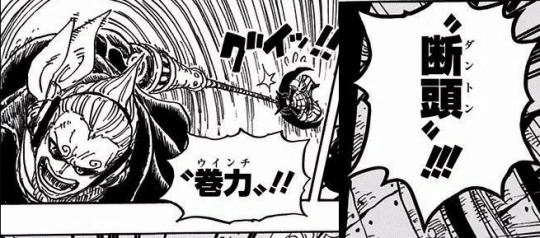
For whatever it's worth, Danton was someone who was executed for opposing the new government after the first revolution. The revolutionaries got so bad that it was called the "Reign of Terror", so Danton turned against them and was trying to oppose this cruelty.
Yonji is rather visibly the least "bad" of the brothers and his reactions are almost like a "normal person" in a lot of ways, so maybe this is significant?
Marudoro-san said that the Nyasha/cat carriage the Vinsmokes were riding when they were about to meet Big Mum was incredibly similar to the funerary carriage of King Louis XVIII. While there are some differences, they do have a point.

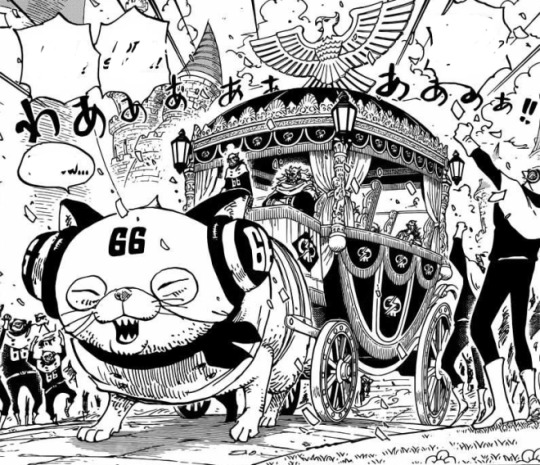
Again, it's still unclear about what significance all of this stuff will have. Maybe the imagery of "revolution" and "King's funeral" indicate that Germa will be undergoing a lot of changes. Something that's beyond just the formation of Neo MADS.
The Knights Hospitaller... and Napoleon?
Marudoro-san says there's an interesting parallel between Germa and the Knights Hospitaller. This is a chivalric order that has privileges that puts them equal to a sovereign power. They have minimal land holdings, but has the standing almost on par with that of a nation. It's like the landless Germa, who is still recognised as a kingdom by WG up until their privileges were taken away after the mess in WCI.
The Knights has lost a lot of its power and territories in Europe through history, and finally, its headquarters in Malta was sacked by Napoleon. Marudoro-san highlighted that Big Mum's hat and sword was called Napoleon.
Marudoro-san took this analysis elsewhere, but for my part, I'm wondering if Germa almost being destroyed at WCI is a parallel of this attack of the Knights in Malta, with Big Mum being the parallel to Napoleon.
The possible proof of the Napoleon parallel is Law. Law was heavily instrumental in Big Mum's defeat in Wano, and his name are connected to events related to Napoleon's downfall.
Napoleon suffered a major defeat at the Battle of Trafalgar, and the man who was his jailer to the point of his death was a surgeon's son named Hudson Lowe. Law and Lowe looks different in English, but in Japanese both are spelled the same: ロー.
[Edit: Napoleon was also famously defeated in the Battle of Waterloo. In Japanese, Waterloo is spelled like this: ワーテルロー. It contains the same "ロー" as in Law's name.]
Marudoro-san said that Napoleon's invasion of Malta involved tricking the Knights to letting him dock under false pretences. I don't know how true this is, but at the very least this is a narrative that is accessible to the Japanese. One could argue that this is parallel to the conspiracy in Whole Cake.
If this parallel is really correct, then, this could be a hint of "Good Germa".
The Knights Hospitaller surrendered and survived that Napoleon encounter, with its status being even more diminished. Eventually it restructured as the Sovereign Military Order of Malta, which still has its sovereign authorities (Wikipedia says they can even issue passports and currency), but is now an organisation whose activities are focused on charity.
Bonus: The Jedi and Clone Wars?? (Star Wars)
Marudoro-san also mentioned that the 66 of Germa reminds them of Order 66 from Star Wars, which ended the Jedi order and enabled the Sith to rise to power.
I only understand Star Wars very minimally myself, but a fan I talked to on Twitter confirmed to me that they think so as well. Especially because there's the specific focus on Germa soldiers being clones, and it's reminiscent of the whole clone plotline in Star Wars.
Order 66 ended the Jedi. The 66 of Germa is in reference to the destruction of the old Germa Empire.
If this parallel is true, then this might confirm the theory that "Germa is not actually evil before". If we read that the "Sith" is World Government, and the old Germa is "Jedi", then maybe it's hinting that all the story about them being evil in the past is a lie? They may be awful now because Judge is so driven by revenge, but maybe they were actually not evil before.
80 notes
·
View notes
Text
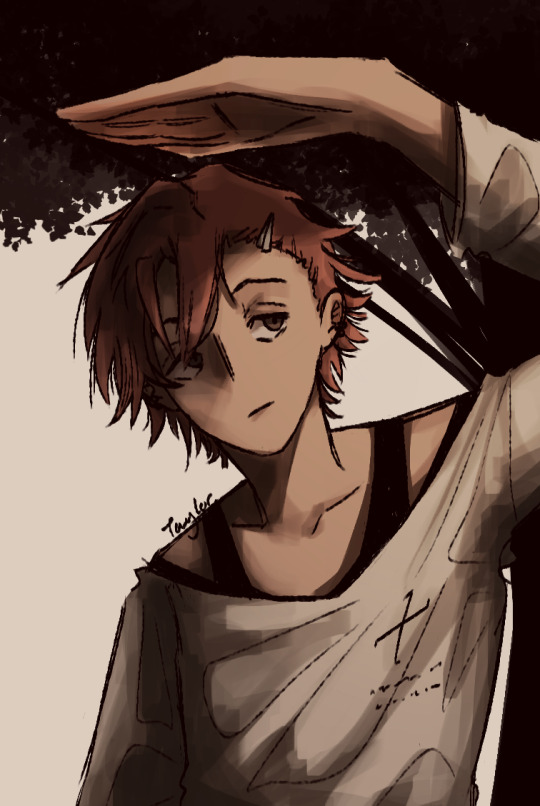
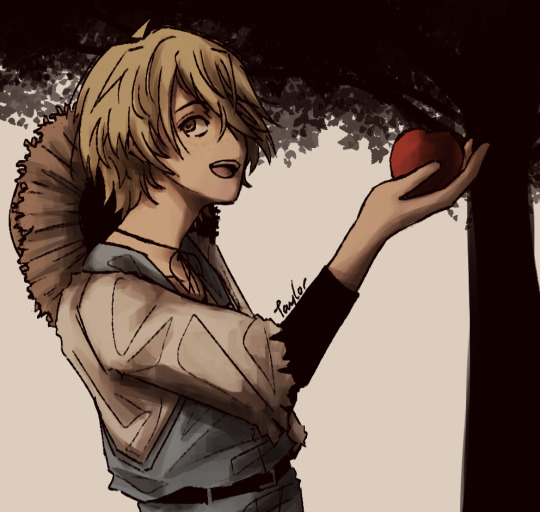
i like them. they're cool.
#bsd#bungou stray dogs#junichiro tanizaki#tanizaki junichirou#kenji miyazawa#miyazawa kenji#fanart#bsd fanart#my art#hAND PRACTICE + FACE PRACTICE + COLOR PRACTICE + L + RATIO#they're actually carrying the new season i smile everytime theyre on screen#YEAH i did manga tanizaki design cause bones took away his transness#also my edgar allan poe book arrived today guess who im gonna draw w a bunch of literary references so soon#i take it back btw i hate both of them im drawing black lizard next#minus hirotsu cause hes an ugly old man#and plus higuchi because i like her even though shes in the command unit and not black lizard#im just gonna draw the port mafia#i should have just said that
550 notes
·
View notes
Note
Does Ser Arys Oakheart’s performance in The Queenmaker in AFFC (killing a handful of men and jumping clear of his palfrey before being swiftly dispatched by Areo Hotah) suggest a decent amount of martial competence on Arys’ part, in your view?
I’m going to make George R.R. Martin fans angry again and say, no. However, this is because I don’t feel any of Martin’s characters (throughout his work) really demonstrate any degree of martial competence. A lot of Martin’s characters aren’t supposed to possess any martial competence, but even the ones who are meant to don’t have it. Their “martial competence” is roughly the equivalent of action figures being angrily smashed together. For me, his fight scenes/battle scenes are the weakest part of his writing and I tune them out. Martin heavily focuses on “ironic” surprises and subversions of expectations like in the scene with Arys Oakheart, where everything is going well and then the character is just randomly and unceremoniously offed.
Boom. Goodbye.
“Like they would be in real life!”
I’m going to imagine someone yelling that because I’m sure someone, somewhere wants to.
Look, unlike Starke, I read A Feast for Crows and I genuinely have no memory of this character. They have been memory holed. They are gone. (Which is wild because I remember random minor character deaths from a lot of other major and minor fantasy properties that I read as a tween ages ago.)
The thing about reality is that real people are also capable of the following: Strategic and tactical awareness, long term strategic planning, working in unison with their fellow soldiers, and, yes, that includes knights in the Middle Ages. Knights in the Middle Ages might’ve (sometimes) been wealthy bastards, but they had to be functionally aware of violence and its impacts or they weren’t knights for very long.
Martin does not understand how armies and professional combatants function, their purpose, or their place in maintaining order in a feudal society. The irony is that politics are not his forte. His combat sequences read like they were written by someone who spent a great deal of time reading original historical accounts and not enough time thinking from the perspective of the people committing those gruesome atrocities. Make no mistake, medieval warfare was far, far more gruesome than anything you’ll find in Game of Thrones and the most terrifying part is the reasoning behind those atrocities was actually sound. Once you’re past the shock value, GOT is fairly comforting because the majority of the time no one makes sense. There’s a moral lesson hidden in the undercurrent ready to bludgeon the audience when they least expect it and all the violence works from that perspective, and all of it is written very specifically with the audience’s reaction in mind. Martin doesn’t seem to care how it works both on the technical front or in the utilization of violence to deliver narrative catharsis, he cares how the audience will react.
His violence doesn’t feel good, which is his intention, he doesn’t want it to feel good, but it also doesn’t feel bad. The violence just sort of exists.
One of the pieces of tragedy that is fundamentally important is a sense of foreboding. In fiction, death flags aren’t necessarily bad. In a tragedy, they’re necessary. Character death doesn’t need to be surprising to be meaningful. In fact, death is often more meaningful when the audience knows it’s coming. Whether it’s because they want the character to die or because they don’t want them to die. Their death creates narrative catharsis. The catharsis releases the tension, it feels good. Satisfaction through tears. When the audience and the narrative knows death is coming, it creates tension. If you invest early, the tension builds, and builds, and builds until it pops. The trouble is that, one way or another, the author has to invest in the character for that to happen. The surprise can be how the character dies, the manner of their death, and even who kills them, but not the fact they die. Shock value is sudden. The reason to use shock sparingly is that it lacks a lasting payout and eventually the audience acclimates. Too much shock obfuscates the narrative importance of a character’s death and shortens the long term impact of their loss. The impact of the death ends up as sudden as the death itself. Here, then gone, then forgotten.
In a well-structured tragedy, it doesn’t matter whether the audience cares about the character who dies or not. It helps, but the focus of the impact is on how it affects the other characters, how that loss is felt, and the way it’s internalized. An observation that’s always stuck with me is when I was in college studying Shakespeare, and my professor told us that Shakespeare structured his tragedies and his comedies the same way. They’re the same until the fourth act, and it’s the characters’ decisions leading into the final crisis which ultimately decides whether the story will end happily or tragically. All Shakespeare’s characters are important cogs in his play (including the bear.) When one of them goes, the narrative and the characters feel it. If a character is never important to the story, then the impact of their loss can’t be felt.
Martin’s characters don’t fight smart. They don’t fight cleverly. They don’t really fight stupid either. They fight with the combined equivalent of a single brain cell failing to function harmoniously. Probably the standout sequence for me that demonstrates this point is the Battle of the Crab from House of the Dragon. They had two dragons, a beach, an isolated cave system where their enemies were hiding to get away from the fire. They had corpses, and they had tar. And what didn’t they do?
Set shit on fire.
Smoke. Cave. Smoke. Cave. Smoke. Cave. Smoke.
The easiest and most low energy plan in the world that should be obvious to anyone who has ever cooked in an enclosed space. While this is a great way to signal that your characters suck at warfare, the characters involved were supposed to be the ones good at it! People being burned alive as they got smoked out of a cave is more gruesome than what actually happened and would have demonstrated the power of the dragons a lot better. Instead of, you know, the mighty House Targaryen being outwitted by… a cave.
If the dangers of dragons could be mitigated by a cave, people would just live in caves and not castles like they do on Pern.
Thank you for listening to my fanwank.
(No, the presence of saltwater would not have, in fact, saved the pirates. However, the Targaryens could have tarred the driftwood, set it ablaze, and let the tide carry it inside in addition to setting fire at every entrance like real military tacticians. Which shouldn’t be a reach given that half the army was made up of sailors.)
(They could’ve also used the crabbed up bodies for this with the added bonus of it being extremely horrifying, smelly, and gross.)
(We’re not talking about the Crab Army.)
(I mean it!)
-Michi
This blog is supported through Patreon. Patrons get access to new posts three days early, and direct access to us through Discord. If you’re already a Patron, thank you. If you’d like to support us, please consider becoming a Patron.
#house of the dragon#game of thrones#literary analysis#how to fight write#writing advice#writing reference#writing tips#michi answers
286 notes
·
View notes
Text
He’s a 10, but he keeps a secret wife in his attic.
#Books#Reading#Literary reference#Jane Eyre#Charlotte Bronte#Currer Bell#Edward Fairfax Rochester#Bertha Antoinetta Mason
11 notes
·
View notes
Text
Alecto Prediction #11
We’ve seen through Corona that when people from the Houses join Blood of Eden, they receive a new Edenite name. We aren’t told who gave her the name Crown Him with Many Crowns in NTN, but I believe that we will find out that it was Pash. It makes sense if we think about which biblical figure Pash correlates to: John the Baptist. In baptism, a person is christened with a name, just like Corona was christened Crown. But John the Baptist is called the Baptist not just for baptizing the average Tom, Dick, and Harry. He also baptized Jesus. And we have a perfectly good lesbian Jesus ready in the wings to ask to be baptized.
This is why I believe that Gideon/Kiriona will join BoE and Pash will give her a new name.
#Gideon’s BoE name would be a cross between a biblical/literary reference and a meme#something like ‘I am the alpha and the omegaverse lawsuit doubt thou the stars are fire shawty got them apple bottom jeans#tlt pash#our lady of passion#gideon nav#kiriona gaia#blood of eden#gideon the ninth#harrow the ninth#nona the ninth#the locked tomb#alecto the ninth#tlt#tlt series#alecto predictions#alecto theories#alectopause#alecto speculation
86 notes
·
View notes